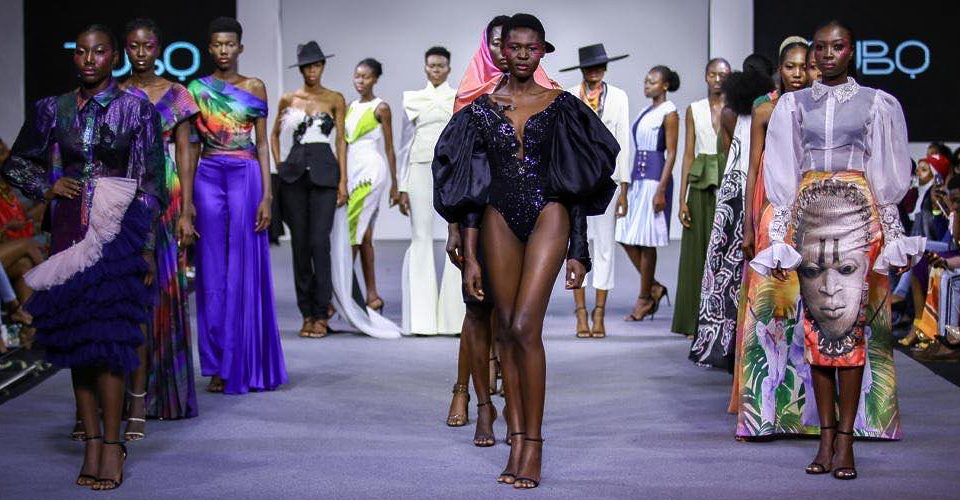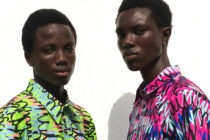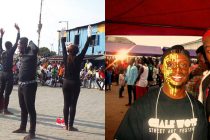As a Designer Coordinator, I am standing backstage in the organized madness of Glitz Africa Fashion Week, in Accra, Ghana. Dressers are steaming this year’s collections, models are getting dressed, some are in make-up. Everyone in this crowded space has their own individual function, everyone is a piece of the puzzle that is Glitz Africa Fashion Week. It may look like chaos to the passer-by, but it is actually highly organized madness. Everyone is focused, and everyone knows what to do to ensure every last model makes it down the runway.
[aesop_parallax img=”https://usercontent.one/wp/krullmag.com/wp-content/uploads/2019/11/image00014.jpeg” parallaxbg=”on” parallaxspeed=”3″ captionposition=”bottom-left” lightbox=”off” floater=”off” floaterposition=”left” floaterdirection=”none” overlay_revealfx=”off”]
I look at Fashion Week as a puzzle, with each different puzzle piece representing the designers. My place in this puzzle is as a Designer Coordinator. I am the person that the designer relies on to be their voice in this organized madness, making sure that they feel like they are an integral part of the whole, but taking every step necessary to ensure that everything that makes them unique is highlighted in the best possible way. This role is not something I take lightly. To be the right hand to designers that I have admired for years. To make sure that designers like, Sisiano, Yhebe Designs, Mai Atafo and Christie Brown have their collections showcased in the best way possible was highly important to me. African designers work hard, and I strongly believe that their vision is something that should be cherished. It was most of the reason why I had been so motivated to make the journey all the way to Ghana.
[aesop_parallax img=”https://usercontent.one/wp/krullmag.com/wp-content/uploads/2019/11/image00008.jpeg” parallaxbg=”on” parallaxspeed=”4″ captionposition=”bottom-left” lightbox=”off” floater=”off” floaterposition=”left” floaterdirection=”none” overlay_revealfx=”off”]
[aesop_parallax img=”https://usercontent.one/wp/krullmag.com/wp-content/uploads/2019/11/image00015.jpeg” parallaxbg=”on” parallaxspeed=”4″ captionposition=”bottom-left” lightbox=”off” floater=”off” floaterposition=”left” floaterdirection=”none” overlay_revealfx=”off”]
I kept running back and forth, checking on designers backstage at the same time as I was handling the production requests. Everything needs to be just right. From lighting, to music cues, to time allocations. There is no room for failure. Every fashion brand will need their own unique platform, to put their collection into context; their brand is their baby, and therefore their everything. To be a design coordinator is to be more than a good organizer, it is to understand. You are the medium between the designers and the public, you make sure the story the designer is trying to tell is told. Glitz Africa as a team did an amazing job in ensuring excellent quality. For me, it was an honor to be a part of this team.
I had arrived in Accra three weeks before the event, so when I got to Glitz Africa the preparations for Fashion Week were already far along. Everyone at the office was very focused on their role. I felt like I literally dove headfirst into the organization. Eating and sleeping for the next weeks was just seen as a bonus.
There were three Designer Coordinators, including me. I was assigned thirteen designers that I would be in charge of. If something went missing or went wrong for my designers, then those complains would end up in my lap. We worked closely on everything, ensuring the shows were aligned with their visions, making sure there were no miscommunications, timing videos perfectly, making sure the right music was playing and meeting any other production requests they might have for their allocated 15 minutes of runway time. I started to contact my international designers that were traveling in from Nigeria and Ivory Coast. Giving them information and making sure that they had all of the details for the upcoming Fashion Week. For the local designers, we were offering fittings one week before Fashion Week. Everything to try to prepare as much as possible before the event because when Fashion Week is starts to roll, there could not be any breaks or exits. With 10-13 designers showcasing their looks every day from Friday to Sunday, it was a long journey. Nothing stopped until the last designer took their bow, the undeniable moment that made every second of struggle worth it.
Glitz Fashion Week represents a New Time. A time where West African Fashion is claiming its spot on the global stage. Glitz Africa Fashion Week is not just Fashion Week, but it is a space where West African Designers can own their own space and tell their own stories. Coming to Glitz Africa was like coming to a new bubble, full of fresh ideas and talented people, populated by West Africa’s top designers and creatives and strengthened by their networks. I had many moments that sent goosebumps down my arms. Standing behind the production table watching each brand show their collection on the runway, I couldn’t help thinking, “This is just the beginning”.
[aesop_gallery id=”5529″ revealfx=”off” overlay_revealfx=”off”]
[aesop_gallery id=”5536″ revealfx=”off” overlay_revealfx=”off”]
[aesop_gallery id=”5510″ revealfx=”off” overlay_revealfx=”off”]
[aesop_gallery id=”5523″ revealfx=”off” overlay_revealfx=”off”]
[aesop_gallery id=”5538″ revealfx=”off” overlay_revealfx=”off”]
A New Time
Fashion is and has always been political, so in West Africa it would not be any different. But there is a new dimension in what space the brands can showcase their collections in. A place that is based more on their own terms and creative flow. A place where everything can be challenged, from stretching and questioning gender norms, to helping to visualize what the future meant for long-held traditional beliefs, helping everyone see what the future holds for West Africa. Things are changing, and they are changing fast and the world needs to pay attention.
words HANNAH WENNERSTRÖM @hannahbwennerstrom
runway photography VINE IMAGERY @vineimagery
backstage photography VINE IMAGERY and DR. SAMIE @samieo_
BRANDS:
ATTO TETTEH @attotetteh
CHRISTIE BROWN @christiebrowngh
ELEANOR RIVERSON @eleanorriverson
KAI’S DIVO COLLECTION @kais_divo_collection
MAI ATAFO @atafo.official
SISIANO @sisiano
THE HOUSE OF PAÒN @houseofpaon
YHEBE DESIGN @yhebedesign




